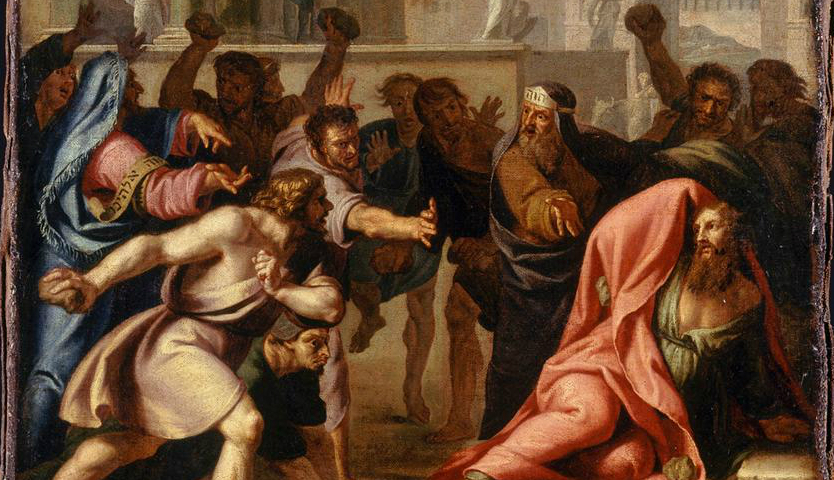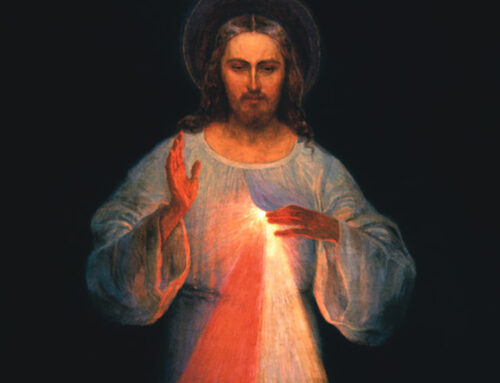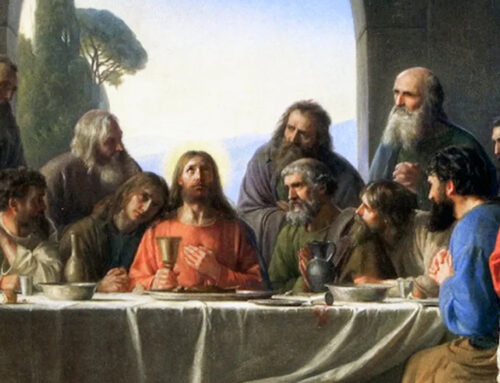“It is necessary for us to undergo many hardships to enter the kingdom of God.”
These words we heard in our first reading might lose their full impact on us if don’t know what just happened to St. Paul in the verses immediately preceding. Paul, of course, has been out preaching the Gospel with Barnabas. And while many people were coming to believe, and the Church was growing very quickly — Paul and Barnabas were also meeting fierce resistance — even violence at times.
And on this occasion, Paul got brutally stoned, dragged out of the city, and left for dead.
THAT is the context in which we then hear this verse: They strengthened the spirits of the disciples and exhorted them to persevere in the faith, saying, “It is necessary for us to undergo many hardships to enter the kingdom of God.”
Imagine! St. Paul was beat up. Bruised. Maybe still bleeding. THAT is when he tells the people: This is necessary! Hardship is somehow… in the providence of God… needed.
This reminds me of a letter I received from a buddy of mine from seminary — now happily a priest — a couple of weeks before my own ordination to the priesthood. In that handwritten note, he told me this:
“Anthony — As you prepare for the priesthood, always remember: Jesus doesn’t need our talents, He needs our willingness to suffer.”
Wow.
He goes on: “I imagined getting ordained and using my talents and gifts to reach souls. The Lord gently corrected that zeal. The real power of the priesthood,” he said “comes from your willingness to enter into the silence of prayer and offer yourself as a victim of love to the Father.”
He ended his note with a verse from Scripture — from the book of Sirach:
“My Son, when you present yourself to serve the Lord, prepare yourself for trials.”
Prepare yourself for trials… This, I believe, is exactly what St. Paul is talking about — after being rejected. After being nearly stoned to death, he and Barnabas exhort and encourage the Church, saying:
“It is necessary for us to undergo many hardships to enter the kingdom of God.”
And so it is today. It is still necessary for us to undergo so many hardships to enter the kingdom.
This shouldn’t scare us. It’s just the ordinary stuff of Christianity.
Back in 1975, Ralph Martin — a leader in the charismatic renewal movement and a prominent theologian today — delivered a prophecy from the Lord after mass at St. Peter’s Basilica in Rome. It was a message promising great hardship. It was also a message promising great glory:
“Days of darkness are coming on the world,” he said — “days of tribulation. . . . Buildings that are now standing will not be standing. Supports that are there for my people now will not be there. I want you to be prepared, my people, to know only Me and to cleave to Me and to have Me in a way deeper than ever before. I will lead you into the desert. . . . I will strip you of everything that you are depending on now, so you depend just on Me. A time of darkness is coming on the world, but a time of glory is coming for my Church, a time of glory is coming for my people.
I don’t know about you, but these words both send shivers down my spine, and yet at the same time — they fill me with new courage.
They are words that carry the same fiery truth, the same burning declaration that St. Paul spoke so many centuries ago:
“It is necessary for us to undergo many hardships to enter the kingdom of God.”
Darkness and danger must come. Painful trials — even chastisements — are sure to happen. The CROSS will in fact find us…
But from the heart of suffering, we will come to find out that Jesus is indeed faithful, that we can ACTUALLY depend on Him for everything!
I think this is what the Lord meant in our Gospel today when He said:
“Now is the Son of Man glorified!”
To be “glorified” means to be exalted — lifted up — elevated and praised.
What made Jesus say He was being glorified? What was happening?
Did you catch the very beginning of the reading today? There we heard: “When Judas had left them.”
That’s right. This is the moment when Judas has slipped quietly out of the Last Supper to go and betray God…to sell out the Lord of the Universe for a handful of coins.
And yet somehow this… THIS was the moment Jesus suddenly erupted with those words of exaltation and victory: “Now is the Son of Man glorified, and God is glorified in him.”
People of Saint Andrews — we are living through a time of glorification as well. NOW is the Son of Man glorified in us.
Because I think it needs to be said very clearly:
It’s really hard to be Christian nowadays.
It just is.
The current is definitively against us. We have lost so much ground. We are being stoned. And as much peace and joy our relationship with God brings us every day, it is also a way of darkness and hardship in so many ways.
But here’s the mysterious truth:
This hardship is the way to glory…Because… “It is necessary for us to undergo many hardships to enter the kingdom of God.”
So when people threaten to invade our Churches and disrupt our liturgies because of the recent Supreme Court leak? I say — “Now is the Son of Man glorified!”
When Tabernacles are stolen from neighborhood churches, and the Eucharist is defiled — “Now is the Son of Man glorified!”
When people refuse to answer a question as simple and basic as “What is a woman?” When the God-given biological differences between male and female are being trampled and ignored. When our children are regularly being force-fed false ideas about what it means to be a human being in tv shows and movies — “Now is the Son of Man glorified”
When our firm convictions make us weird, bigoted, stone-aged, or hateful — “Now is the Son of Man glorified!”
When God and religion are sidelined, belittled, and silenced — “Now is the Son of Man glorified.”
When radicals on both the left and the right seem only interested in stirring up unrest, polarization and division — “Now is the Son of Man glorified.”
Why? What makes me say that this is a time of glorification?
Because now we get to love from the heart of hardship!
Now we get to show mercy and humility in the face of anger and rage! We get to pray and fast in silence for the very people trying so hard to shout us down and pressure us into losing our faith. We get to share the peace and beauty of the Gospel of Life in the midst of the chaos and upheaval of the Culture of Death!
We have a unique opportunity today — as every generation of Christians has before us — to love the world even as Jesus Himself loved it:
To love the world as it actively crucifies us!
This is the heart of the “new” commandment Jesus gave us:
“I give you a new commandment: love one another. As I have loved you, so you also should love one another.”
This is a COMMANDMENT… not a suggestion. This is the same Jesus who also said: “If you love me, then KEEP MY COMMANDMENTS”
What does it mean for us to keep this commandment? What does it mean to have this kind of love alive in our hearts?
It means that we freely “undergo many hardships and so enter into the Kingdom of God!” It means we love until it hurts — that we love even when we are not loved in return. It means that we put the good of others before our own safety and comfort.
This will be painful. This is sure be imperfect and messy — But in the end, if we persevere in charity and lean fully on grace — God Himself will come and, as we heard in that second reading from Revelation: He will “wipe every tear from our eyes, and there shall be no more death or mourning, wailing or pain, for the old order will have passed away.”
Jesus promised us: “Behold, I make all things new.”
All the saints have known this, and they show us how to actually live it.
Today in Rome, Pope Francis is canonizing several new saints, one of whom is a Dutch Carmelite priest and journalist named Titus Brandsma. This man fearlessly spoke out against Nazi propaganda, which led Pope St. John Paul II to call him a “martyr of freedom of expression.”
But because his views dared to contradict the prevailing Nazi narrative, Father Titus was sent off to a concentration camp, where he and so many millions of other people underwent literal hell on earth.
For all his suffering, however, Fr. Titus did not stop loving… did not stop glorifying God.
As the story goes, he was eventually sentenced to die by lethal injection — and as the nurse came to administer the shot that would end his mortal life, Titus looked her in the eye, told her that he forgave her, and then gave his own handmade rosary to her.
What a beautiful expression of sincere love! — In this tiny little act of charity and forgiveness, which was so easily overlooked amidst the horrors of a concentration camp, we can truly say:
“Now is the Son of Man glorified.”
But the story didn’t end there! Amazingly, that nurse ultimately converted back to the Catholic faith, repented of her involvement with the Nazis, and stepped forward to share this beautiful story about her encounter with Father Titus — which really was an encounter with Jesus.
That is the power of Divine Love, the love that Jesus commands us to have for one another: It conquers the worst kind of evil through simple, sincere goodness. It defies falsehood by giving itself away freely.
So whatever hardships you happen to be going through right now, whatever difficulties or burdens you are being stoned with — the challenge is the same. The commandment is the same:
“Love one another, as I have loved you.” —— Love like Jesus!
We can do this together by bringing all of our hardships to the altar today. Bring your pain. Bring the darkness, doubt, worry, and confusion — offer it in the Eucharist.
We offer it together.
Because here, Jesus makes all things new.




